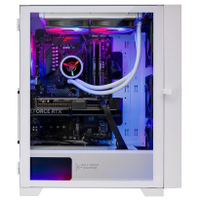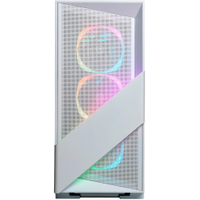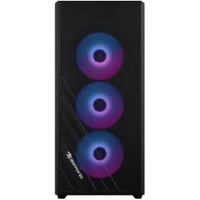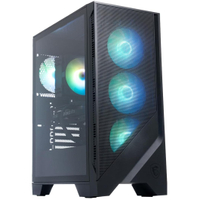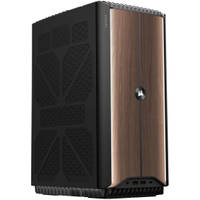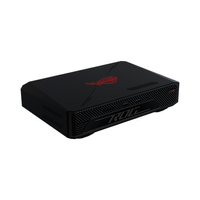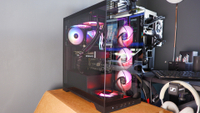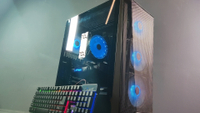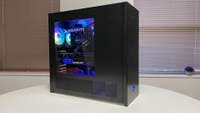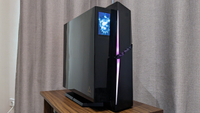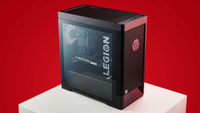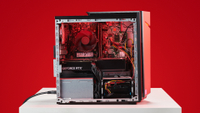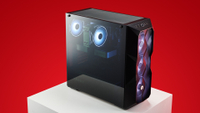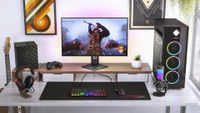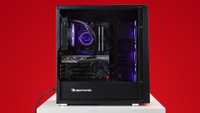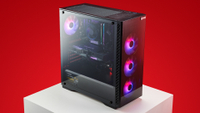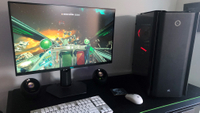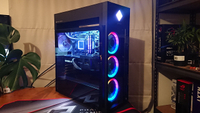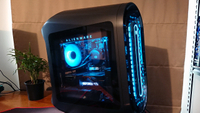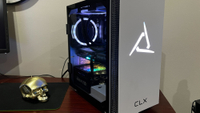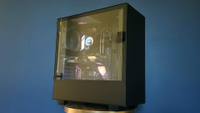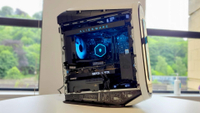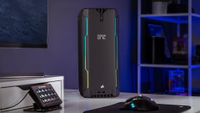Best gaming PCs in 2024: these are the rigs and brands I recommend
Everything you need to know about buying the best gaming PC today.
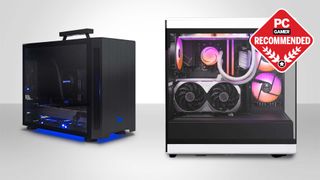
The best gaming PC is a thing I've been wrestling with since I re-joined PC Gamer getting on for five years ago. It's impossible to test every single configuration and maker of gaming PC that is on offer, and so we can only ever offer a snapshot based on the machines that we have physically tested ourselves, and then give you a good idea of how effective other configurations might be based on our own experience.
For myself, I've been testing PC gaming hardware for nearly twenty years now, and yes, that does make me feel old, and no, I don't want to have a nice sit down, grandpa. But that means I have a wealth of experience testing—and building—gaming PCs, so I know what makes a good one, and what components you should be picking to fit a certain budget.
You can spend a small—and sometimes not so small—fortune on unnecessary components when you could have bought a PC with higher actual gaming performance if you'd made the graphics card the focus. But that's not to say that's all you need to keep an eye on, because in my many years as a PC gaming tech journalist, I've reviewed a lot of unbalanced machines and they rarely deliver over a more rounded spec.
We have a host of new machines we've tested recently in this guide, and a ton of new systems on the way from various manufacturers to keep it topped up with fresh potential winners. But, for now, the iBuyPower RDY Y40 Valorant is the best gaming PC, with the oft-discounted Lenovo Legion Tower 5I as the best budget gaming PC.

Ever since building my first gaming PC as a teen I've been fascinated by their guts and have turned poking, prodding, and testing systems into a profession. Over the last 20 years or so I've tested hundreds of gaming PCs and have always been more interested in how a manufacturer squeezes the best parts and the best performance out of their budget. But I can't lie, I do love an over-the-top big rig, too.
The quick list
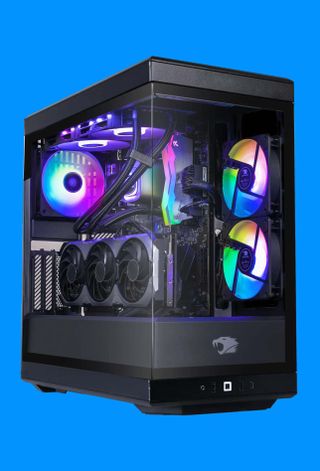
The best overall
The iBuyPower RDY machines offer a great mix of components and different specs and are some of the quickest to ship systems we've seen. The RDY Y40 Valorant is an excellent, affordable build packing a great mix of components.
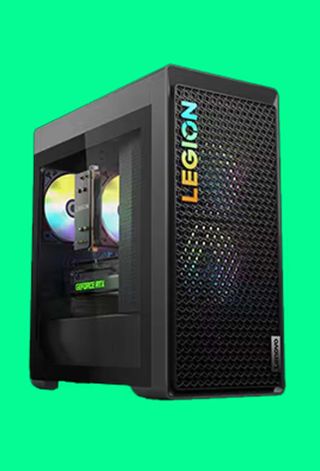
The best budget
The Legion Tower 5i is a great budget gaming PC, with smartly chosen parts, and a quiet and cool chassis that can deal with the components inside without fuss. It's also a decent base to build from in the future, too.
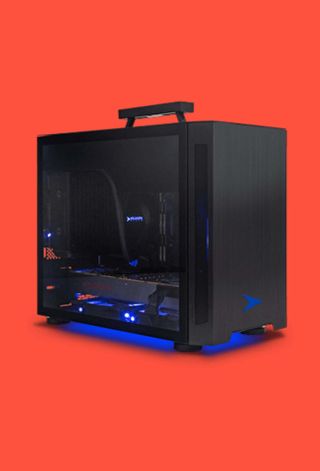
The best small form factor
Velocity Micro's diminutive Raptor ES40 has been around for a while now, but it's still a mighty capable design, and can be configured with the latest hardware. If you're after something small but powerful this is it.
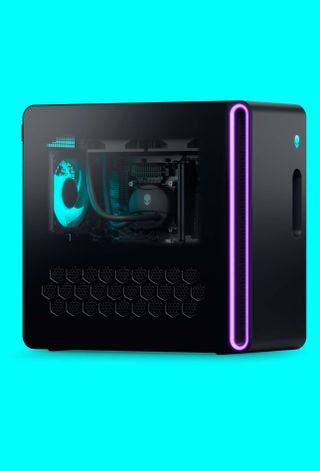
Don't buy without a discount
Alienware is one of the most popular gaming PC manufacturers around, but the shine has slowly worn off for us as Dell's corporate grip tightens. The Aurora machines still look beautiful, but the build quality has been lacking in recent years, and the value proposition all but non-existent. The bespoke components aren't premium, and yet carry a premium cost.

The best mini PC
This is PC Gamer, so the best mini PC needs to be able to do that, and with the discrete RX 7600M XT inside it, the AtomMan G7 PT is absolutely capable of delivering on that front. Its eight-core, 16-thread Zen 4 chip is also equally capable of any productivity goodness, too.
Recent updates
Updated December 1, 2024 to add in a note about the Cyber Monday sales which have just started today.
The best gaming PC $1,000 - $2,000









Specifications
Reasons to buy
Reasons to avoid
Our favorite config:
PC Gamer's got your back
Ryzen 7 7800X3D | GeForce RTX 4070 | 32 GB DDR5-5600 | 2 TB SSD
This version of the RDY Y40 Valorant sports the finest gaming CPU of the last Ryzen generation and it still offers frame rates that Intel wishes it could offer in its own latest processors. Along with that you get the RTX 4070 Super and a huge chunk of memory and storage space, too.
✅ You don't want to cut too many corners: With a solid case from Hyte and vertical GPU mounting, this iBuyPower machine offers more than you'd expect from more affordable pre-built PCs.
❌ You want peace and quiet: This machine isn't unusually noisy for a gaming PC, but it's definitely on the louder end of the PC gaming spectrum. A couple more premium fans wouldn't go a miss as an upgrade down the line.
The first thing we can say about iBuyPower machines is that they are great at getting shipped around, the next thing to say is that the iBuyPower RDY Y40 is the best gaming PC around right now. Our review samples have to cross over the Atlantic, and iBuyPower machines have always arrived intact. Which is not something that can always be said of systems just shipped within the same country.
One of the bold steps iBuyPower has taken is to ship its gaming PCs without a graphics card installed. But wait, before you get spit the proverbial dummy, it's packaged separately waiting for you to install it. And a GPU fitting is one of the most straightforward of component installations, so is nothing to be feared. The company provides the clearest instructions on how to go about the process and it will be completed in minutes.
A small price to pay to make sure your PC arrives in working order, without an errant GPU having caused havoc inside your chassis after coming loose in transit.
The next thing to say is that this is an impressively specced, impressively affordable system. The RDY Y40 Valorant VCTA R003 we've recently had in for review has a silly name, but a serious spec. The last-gen AMD Ryzen CPU was one of the best of its generation, and the RTX 4070 Super is the same but for GPUs.
In terms of performance, the iBuyPower delivers all the 1440p gaming performance you could ask of it. That's where it's most comfortable—try and get it gaming at 4K and you will find the limitations of that mid-range Nvidia graphics card—and with the judicious use of DLSS and Frame Generation you'll find yourself hitting three-figure frame rates in the latest games.
Our only real concern with this build is around the cooling. The PNY version of the RTX 4070 Super has a pretty basic cooler attached to it, and the Hyte Y40 chassis is also guilty of not really delivering a ton of airflow over the main components, either.
But then I do dig the style of the chassis. My own personal PC at home is rocking the Hyte Y70, which I've called a techie terrarium, and the more affordable Y40 has a dual-sided tempered glass finish which still puts your rig's insides on show.
The SSD is a bit of a weak point here, though, and a strangely low-rent offering considering the performance parts on offer elsewhere in the build. The 1 TB bit is fine, but the WD Blue SN580 is a relatively sluggish SSD in terms of competing PCIe 4.0 drives. Not that you'll really notice that in gaming.
Otherwise, the iBuyPower RDY Y40 Valorant is a tidy, smartly-specced gaming PC, that is really capable of delivering the goods. And will almost definitely be delivered intact, too. But with a healthy 3 year warranty, you're covered anyways.
Read our full iBuyPower RDY Y40 Valorant VCTA R003 review.
The best alternatives:
Skytech Shiva | Core i5 14400F | RTX 4070 Super | 32 GB DDR5-5200 | 1 TB SSD | $1699.99 $1,299.99 at Newegg (save $400)
This Skytech RTX 4070 Super build costs more than the Yeyian Tanto 4070 Super build above, but for that extra cost you're getting a slightly better CPU and an extra 16 GB of (admittedly slower) RAM. Plus, you get that lovely white chassis.
CyberPowerPC Gamer Supreme | Ryzen 7 7800X3D | Nvidia RTX 4070 Super | 32 GB DDR5 | 2 TB SSD | $1,699.99 $1,429.99 at Best Buy (save $270)
While there are cheaper RTX 4070 Super gaming PCs on this list, this is probably the best overall proposition. In fact, it's probably the best proposition overall right now, out of any gaming PC, for most gamers. That's because the 4070 Super here is combined not only with 2 TB storage but also one of the best gaming CPUs on the market, 32 GB DDR5 RAM, all housed in a lovely chassis to boot.
The best gaming PC around $1,000 or less









Specifications
Reasons to buy
Reasons to avoid
Our favorite config:
Core i5 14400F | RTX 4070 | 16 GB DDR5-4400 | 1 TB SSD
This is the budget configuration we'd be after, and we've seen this system going for as little as $850 in the past few weeks. It's simple, has a whole lot of 1080p gaming performance, and is a well put together piece of gaming hardware.
✅ You want a simple entry-level gaming PC: The Legion Tower 5i is a no-frills gaming PC, that does the basics rather well.
✅ You want a machine from a big-name brand: Alienware's obsession with proprietary parts means we'd rather have an equivalent Lenovo rig any day.
❌ You want extended future-proofing: It will be a great PC for right now, and there is a spare SSD slot, but that limited PSU will make it tough to upgrade the graphics card without also upgrading the power supply.
❌ You're happy shopping around: Such is the competition in the budget gaming PC space that there is a good chance you may well find similarly specced rigs from other system builders for less.
The Legion Tower 5I is my pick as the best budget gaming PC I've tested because it knows what it is and does what it does very well indeed. As I say in my review, it's resolutely, uncompromisingly just a PC. There are no over-the-top gamer frills to eat up extra dollars, just a simple, well put-together gaming rig for a good price.
Most of the time.
That's the issue here; while you will almost always find the Legion Tower 5I on sale with a healthy discount putting it below the $1,000 mark, there are times when Lenovo tries to get away with selling this budget PC at a price that doesn't make sense.
But when you do find it on sale for the right price, this is an ace little gaming PC. It's not filled with proprietary parts—yes, I'm looking at you Alienware—but you are getting OEM versions of the components on show here. So that RTX 4060 is an unbranded version, but it's a sweet little boi, though, being a seriously small form factor version.
Which is great because the budget Ada GPU doesn't need a ton of power or cooling to do it's thing, so it doesn't need to be a hulking brute of a graphics card.
In fact, that's one of the things that impressed me while I was testing the Legion Tower 5I; its cooling chops. The CPU chip chiller is super basic, and the GPU small, but there's a healthy amount of airflow in the case, and when gaming I never saw either go above the 76°C mark.
Despite it's mid-tower scale, Lenovo has used an OEM mATX motherboard inside it, which is something to be mindful of should you decide to do a big platform upgrade in the future. You'll need to go for a motherboard that fits the space.
But as Lenovo has used standard, if OEM parts, those sorts of upgrades are eminently possible. Even smaller in situ upgrades are possible, with a second SSD slot on the barebones motherboard it ships with. Though a big GPU update might be a stretch as the 500 W PSU would struggle with anything beyond an RTX 4060 Ti.
As a budget system, it's performance targets are all 1080p, though interestingly we did get some decent 1440p figures out of it with DLSS and Frame Generation enabled. Realistically, though, 1080p should be your res de jour.
The thing to say, however, comes back to that price argument. You will absolutely be able to find cheaper gaming PCs with the same specs if you shop around—and we've provided alternatives we like down there👇—but if you want a name brand, and a rock-solid build out of the box, the Legion Tower 5I will hit the mark.
Read our full Lenovo Legion Tower 5I review.
The best alternatives:
iBuypower Scale | Core i5 14400F | Nvidia RTX 4060 | 16 GB DDR5-5200 | 1 TB SSD | $949.99 $699.99 at Best Buy (save $250)
It's difficult to imagine finding more gaming PC for $700 than this one right now. The Intel Core i5 14400F might not be much of an upgrade on its predecessor, but it's still a plenty-fast little gaming chip. Plus, that RTX 4060 is capable of excellent 1080p gaming performance, and even a dash of 1440p with DLSS 3 help and some settings adjustments. You get a proper 1 TB speedy storage drive and a healthy dose of DDR5 in the mix, too, and even a keyboard and mouse!
MSI Codex R2 | Core i5 14400F | Nvidia RTX 4060 Ti | 16 GB DDR5| 1 TB SSD | $1,199.99 $999.99 at Amazon (save $200)
While the MXZ RTX 4060 Ti build above is great if you're on a strict budget, if you can spare an extra $100, this MSI one is well worth it. That's primarily because it has a more recent (and more powerful) CPU, as well as DDR5 RAM which should make for a better upgrade down the line. It's an ideal entry-level rig for this reason.
The best small form factor gaming PC













Specifications
Reasons to buy
Reasons to avoid
Our favorite config:
Ryzen 5 9600X | RTX 4070 Super | 16 GB DDR5-5200 | 2 TB SSD
The issue with the Raptor ES40 is the price. There's a pretty hefty price premium for small form factor gaming PCs. But if you are going for a pure gaming PC, then the six-core, 12-thread Ryzen 5 9600X is plenty CPU enough for most tasks. You can likewise get by with just 16 GB RAM, but I'd still go with a 2 TB SSD, especially as the motherboard doesn't have a spare SSD slot inside it.
✅ You want a powerful compact machine: For a small form factor prebuilt system, the Raptor ES40 is an excellent mini PC with enough space to grow, too.
✅ You want to take your PC on the move: Did I mention it has a carry handle?
❌ You're after a PC with a ton of storage: Outside the 2 TB drive this version ships with that's it for speedy storage, with just a pair of SATA ports available for expansion.
❌ You might consider a monster CPU in the future: The A620I motherboard is the real weak point of this build and might struggle with a beefy AMD processor.
The venerable Velocity Micro Raptor ES40 has been around for a while now, but for my money it's still the best small form factor gaming PC you can buy as a prebuilt. The chassis may not be as immediately arresting as something like the Corsair One, but it's a far more practical machine.
The ease of access to the insides of the Raptor ES40 is very welcome, with a tool-less pair of side panels, and the straightforward design of this own-brand mini ITX chassis means it's easy to get at everything inside if you want to fiddle. And I'm a fiddler, for sure.
It's a super tidy build, with nothing feeling cramped inside that small chassis. I reckon I could even get an RTX 4090 in there if I really tried. It almost fit when I was messing around in the office, only the front intake fan made squeezing Nvidia's biggest card an issue.
But you are getting the RTX 4070 Super inside this machine, so you'll be okay on the GPU front for a while, especially if you are sticking to the 1440p level where this card feels most at ease. It's capable of delivering excellent frame rates at that level, especially when you start getting busy with DLSS and Frame Generation.
The CPU is right up there, too. The Ryzen 7 9700X is one of the latest, and best non-X3D chips you can buy from the recent Zen 5 generation. And this is one of the reasons that the Raptor ES40 has a tendency to post higher gaming frame rates than the iBuyPower machine that tops this guide right now.
My only real concern is the motherboard Velocity Micro has shipped this machine with. We've tested the Gigabyte A620I AX and have found it a decent budget mini ITX board, but it's not the sort of motherboard I would have expected to find in a gaming PC that costs well north of $2,000.
It's not that it affects gaming performance, it clearly does not, but the upgrade potential and usability definitely is affected. There is only a single M.2 slot on this board, so if you want to improve the storage on offer you either entirely replace the boot drive or you buy an old, slow SATA drive.
It is also a bit lacking in connections on the back panel, though that is almost par for the course with mini ITX motherboards. What's maybe more concerning is the weak 5+2+1 VRM setup, which is going to make it a struggle getting a more power-hungry CPU installed in the future.
That 750 W EVGA SFX power supply, however, won't be the thing standing in your way of an upgrade. You could go all the way up to an RTX 4080 Super with this bad boi. If you can get it to fit in the chassis.
Read our full Velocity Micro Raptor ES40 review.
The best alternatives:
Corsair One i500 | Core i7 14700 | RTX 4070 Super | 32 GB DDR5-6000 | 1 TB SSD | $2,299.99 at Corsair
Corsair's latest One chassis is a little chonkier than the original SFF setup, but that means it's got a lot more room to breathe. And that allows its Intel CPU to function and the RTX 4070 Super to actually achieve the frame rates you would want.
Alienware








Specifications
Reasons to buy
Reasons to avoid
Our favorite config:
Intel Core i7 14700F | Nvidia RTX 4070 Ti Super | 16 GB DDR5-5600 | 1 TB SSD
It's not often that an Alienware gaming rig will pop up that actually has a hell of a lot of tech inside it for a surprisingly competitive price, but here we are. This Aurora R16 comes with the RTX 4070 Ti Super, and you get 16 GB of relatively speedy DDR5. The 1 TB SSD is a bit weak in terms of storage—I'd much rather have a full 2 TB SSD at this price. Our major issue with recommending Alienware PCs now, however, is the bespoke hardware inside either locking you out of future upgrades, or locking you into an unnecessarily expensive upgrade path.
✅ You just want plug and play: Alienware machines will just work out of the box and with the might of Dell behind it you can be relatively confident that you'll be looked after if something goes awry.
✅ You're into the aesthetic: Alienware rigs look good, and unlike any other machine on this list. The curvy chassis are a world away from the boxy towers otherwise used. But they certainly are big...
❌ You want peak performance: We've not had great experiences with recent Alienware machines delivering the performance their parts ought to. That's often down to the bespoke nature of the components and sometimes ineffective cooling.
❌ You want to upgrade your PC in the future: No PC is truly future proof, no matter how much you spend, so either you upgrade your rig, or you buy a new one. With Alienware, you're largely locked into the latter by its use of bespoke motherboards, chassis, and PSUs.
❌ You want value for money: The deal above is a rarity for Alienware PCs. More often than not you'll be paying well over the odds for a machine that performs notably worse than an equivalently priced system from pretty much anyone else.
Alienware is one of the biggest names in gaming PCs, with a heritage stretching back to the dawn of time. Well, 1996 anyway. With a penchant for stylish designs and high-performance hardware it cemented its place in the burgeoning sphere of gaming-focused PCs. In 2006 it was bought wholesale by corporate PC giant, Dell, and that helped bring an economy of scale to the brand that previously it didn't have access to.
But that hasn't necessarily meant those economies of scale have been passed on to the consumer, as Alienware has always kept itself as a premium tier brand within the Dell portfolio. Which was fine when it was offering a premium experience to the people who bought its PCs.
When I was a whelp I used to hanker after Alienware PCs and laptops, but as I've gotten older, so Alienware has changed. It's become more and more like its corporate Dell overlord, and far less tantalising a prospect. My biggest issue is the use of proprietary components, which would be fine if they were the finest, and beyond reproach, but you will find other equivalently priced builds with superior motherboards and power supplies that you can also upgrade in the future. And price is definitely an issue, too, with the Alienware premium not really buying you anything tangible for the extra. I will reiterate my mantra, never buy a full price Alienware, because they only become worthwhile with a hefty discount.
For years we have had Alienware on the top of our best gaming PC lists, because historically its systems could be relied upon to deliver a top-tier experience and premium performance. In recent times, however, we've reviewed different Alienware gaming PCs and have found they fall short of our expectations. Given some performance issues, cooling problems, and concerns around bespoke components, we would categorically say you shouldn't buy a full price Alienware PC and only look to pick one up when they are heavily discounted.
The bespoke components used inside them sometimes fall short of the sort of performance you'll get out of motherboards, coolers, and power supplies you can buy from other named brands, such as Corsair, Asus, or MSI. They are also generally designed specifically for use exclusively inside Alienware's own chassis, which means those cases don't allow for third-party upgrades down the line. At least not without some serious modifications. At best that locks you into the Alienware/Dell ecosystem of high-priced hardware, and at worst locks you out of upgrading your expensive rig at all in the future.
Read our full Alienware Aurora R16 review.
The best mini PC






5. Minisforum Atomman G7 PT
Specifications
Our favorite config:
AMD Ryzen 9 7945HX | Radeon RX 7600M XT | 32 GB DDR5 | 1 TB SSD | $1,199 at Minisforum
For simplicity's sake, we recommend picking up the variant that comes with 32 GB RAM and a 1 TB SSD with Windows 11 pre-installed on it. It's only $200 more than the barebones version, and to get the same package would likely cost around the same if you were to shop around yourself.
✅ You're after high performance in a tiny footprint: The combination of 16-core Ryzen CPU and RX 7600M XT discrete GPU makes this a powerful computational beast as well as a decent, tiny 1080p gaming rig.
❌ You want a PC that will grow with you: There's no real upgrade path when both the CPU and GPU are soldered onto the board and non-replaceable.
❌ You want more than 1080p gaming: With the best will in the world, the RX 7600M XT is not a GPU that will be comfortable at 1440p or 4K resolutions in-game.
The Minisforum AtomMan G7 PT is our pick as the best mini PC for gaming, simply because it comes in a tiny form factor, with excellent cooling, and a seriously impressive CPU and GPU combo. Packing the 16-core AMD Ryzen 9 7945HX means that you get stellar levels of processing power, making it an eminently portable workstation.
But for us, it's the inclusion of the Radeon RX 7600M XT (yes, it's all AMD here) that tips this system over the edge of standard mini PC-dom and into the realms of gaming PCs. Sure, you're not going to get the same sort of gaming performance as you'll see in the hyper-expensive Asus ROG NUC with its mobile RTX 4070, but it's also cooler and quieter for it.
You're still getting mighty 1080p gaming performance from the AMD GPU, and way beyond what you'll see from any integrated GPU you could mention.
The elephant in the room is arguably that light show on the side of the AtomMan G7 PT, but don't let that put you off this excellent, very PC Gamer mini PC. You can turn it off, don't worry. And once the primary-colored badges are disabled it's a more restrained system, but only in aesthetics. You're still getting a supremely powerful AMD Ryzen 9 CPU, with 16 full Zen 4 cores and 32 threads of processing power. You're also getting a discrete RX 7600M XT GPU inside which is capable of delivering excellent 1080p gaming performance in a pint-sized package. For simplicity's sake, we recommend picking up the variant that comes with 32 GB RAM and a 1 TB SSD with Windows 11 pre-installed on it. It's only $200 more than the barebones version, and to get the same package would likely cost around the same if you were to shop around yourself.
The AtomMan G7 PT is potentially the most PC Gamer of all the mini PCs we've tested in recent times, and that's because of its gaming prowess and barebones nature. You can pick it up with 32 GB of DDR5 and a 1 TB SSD with Windows on it, and that is the straightforward choice, but if you wanted to go rogue and slap 96 GB of DDR5-5200 in there you could. You could also go with two separate SSDs, too, as it ships with both PCIe 5 and PCIe 4 M.2 sockets.
Read our full Minisforum AtomMan G7 PT review.
The best alternatives:
Asus ROG NUC 970 | Intel Core Ultra 7 155H | Nvidia RTX 4060 (mobile) | 16 GB DDR5-5600 | 512 GB SSD | $1,399 at Asus
Yes, I know, it's a lot for an RTX 4060 machine when you pick up a better specced one for literally half the price with more memory and storage from Yeyian. But if you want smol, you have to make a compromise, and that compromise is going to have to be how much you're willing to spend to get the size. Still, it's a lot cheaper than the RTX 4070 version...
Benchmarks
How we test gaming PCs
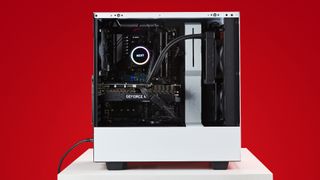
We spend a lot of time testing gaming PCs to ensure that we know what sort of experience you would get should you spend your hard earned cash on one. Experience is an important factor—you want to know that pulling your new rig from its box that it's going to work as soon as you plug it in, and let you get up and gaming as soon as you can download your favourite games.
But the general feel of using a PC is one part of it, it's also important to get the relative performance numbers to be able to see how a given machine performs in games compared with other systems. We run a selection of benchmarks to gauge CPU performance, storage performance, and of course gaming performance.
We have a new gaming PC benchmarking gauntlet which we're putting every new system we get through. We are mixing native gaming performance as well as upscaled and with frame interpolation, too. Our game testing is all done at 1440p as that is the sweet spot for gaming right now, and will highlight both the performance of low- and high-spec machines.
The games we test are:
- Avatar: Frontier of Pandora
- Cyberpunk 2077
- Baldur's Gate 3
- Black Myth: Wukong
- Metro Exodus Enhanced Edition
We use Frameview to capture both the average and 1% Low frame rates, to help us highlight how smooth the experience might be, or how janky in some cases. We also use it to capture temperatures on both the CPU and GPU in gaming scenarios.
In terms of the wider system performance we use 3DMark Time Spy Extreme and the Storage benchmarks to check into CPU, GPU, and SSD performance with the industry standard UL benchmarking suite. We also use Cinebench 2024 and Blender 4.2.0 to test CPU rendering performance and Handbrake to test video encoding. We also test file handling with the built-in 7Zip benchmark.
We will get inside the machine to see how well built it is, and how well the builder has tidied up the mass of cabling that always lurks inside a gaming PC. It's also important to know how much of an upgrade path a system might have, whether there is space inside for a extra storage, or more memory, etc.
Value is also a key concern for us. A gaming PC represents a large outlay, and no matter whether it's a $900 or a $5,000 machine, it still needs to be able to justify its cost by the quality of the build and the components inside it.
Check out how we test all PC gaming hardware.
Selection criteria
Our selection criteria for picking the best gaming PC comes down to the brands we've used and have had good experience with, and the ones who consistently put together good-value, well-specced machines.
It's not possible to review every single gaming PC on sale, but we have tested PCs from all the major manufacturers, and have experienced the unboxing and shipping processes they use.
But the biggest thing is always going to be the mix of core configuration and the overall price. If there's a machine with a great GPU and CPU combination, but is priced well beyond the competition then it's not going to get the nod from us. Equally if a PC maker consistently pairs its gaming PCs with single channel memory (*cough*Alienware*cough*) or reliably sticks 512 GB SSDs in with $1,500 systems, they're not going to get a recommendation from us, either.
How to choose a gaming PC

As a PC gamer your primary point of reference for picking your new gaming PC should be around what graphics card it has inside it. That is the key component when it comes to getting the highest frame rates for your games and is the first decision you must make... once you know what budget you have to work with.
Check out our list of the best graphics cards for a run down of the current state of the GPU market, but we've also got our graphics card hierarchy list below where you can see in a quick snap-shot just how they perform against each other.
Once you've got your GPU picked, then it's about finding the best-value gaming PC sporting that graphics card. And, as I said before, you want to make sure you get a balanced PC for all that you might want to focus on the GPU at its heart. You need to have a processor that can keep your graphics card fed with data, and memory enough that your system doesn't collapse under a weight of Chrome tabs.
The minimum we would recommend on the memory front today would be 16 GB, but we would also suggest making sure that comes in two separate sticks (often denoted for a 16 GB kit as 2x 8 GB). That ensures you get the highest memory bandwidth possible from so-called dual-channel memory. With a single stick of memory you will only get half that bandwidth.
While you do need to have a processor, or CPU, that's able to keep your GPU running at optimal pace, that doesn't mean you need to have a million cores to do it. Unless you're engaging in a lot of video editing or 3D graphics work, a CPU with six or eight cores will absolutely be enough for a gaming PC. Don't be desperate to bag a 16-core chip if all you're going to be doing is playing games. We've picked the best CPUs for gaming from the current chips available, so it's worth checking out any build you're interested in against that list.
Finally, storage. This is an area where a lot of system integrators cheap out on, and with games taking up an inordinate amount of capacity today it's worth making sure you're set from the off. The minimum today—unless it's a super bargain rig—should be a 1 TB SSD. It is the easiest upgrade, but one you don't want to have to be doing as soon as you set up Steam on a new machine.
GPU hierarchy: How do the GPUs stack up?
The most important component for any gaming PC build will always be the graphics card. That will give you the best idea about how one machine matches up with another just in terms of raw gaming performance.
Below, we've listed the slew of GPUs we've had over the past couple of years listed in terms of their Time Spy Extreme index score as a way to put them in some consistent hierarchy. This doesn't cover the performance difference between graphics card in every instance, as differences in how they handle ray tracing other graphical effects can play a part. But this is a handy one-shot method of getting a rough idea of how the various cards from these various generations of GPU stack up against each other.
Gaming PC reviews
Starforge Systems Navigator Pro
Clearly made with care and attention, the Starforge Systems Navigator Pro is a well-tuned, well-built gaming PC. For a much more premium build, it is more expensive than some PCs with a similar specification, which will see it only appeal to those with more flexible budgets.
PC Gamer score: 88%
The Skytech Chronos 2 sits at the low-end of the current gen RTX 4070 machines, but is an all-over well presented machine with impressive gaming performance. The issue is actually you can buy other Skytech machines with an RTX 4070 in for less.
PC Gamer score: 78%
The Velocity Micro Raptor Z55 delivers monster gaming performance for a massive amount of money. It's hardly a value proposition. But if you're totally price insensitive and you favour engineering depth over snazzy styling, this could be your kind of machine.
PC Gamer score: 75%
I just can't get over its ludicrous price. In fairness to MSI, pricing is variable. We're still early in the RTX 40-series and 13th Gen product cycles. That means the Trident X2 is sure to have a long shelf life. If MSI were to drop pricing to more palatable levels, my conclusion would be different, but at this price there's simply no way I can recommend the Trident X2. Shop around. You'll find something just as good and have enough money left over for a game or ten, a decent monitor or… you get the picture.
PC Gamer score: 52%
The Legion Tower 5 is a well-made system, with clean cable management, quiet operation, and space to upgrade. But the uninspiring component choice and relatively high price make it a difficult system to recommend against the competition.
PC Gamer score: 69%
When you can get an RTX 3060 Ti-powered machine with double the SSD space for just $100 more, it's really hard to recommend a machine like this. 238GB of NVMe storage just isn't enough, and the HDD won't save you—however large it is.
PC Gamer score: 65%
The name may be basic, but this is a quality build that focuses on gaming first and foremost. Shame a bit more attention didn't go into the storage though.
PC Gamer score: 85%
HP's Omen 45L is superb for 4K gaming with its i9 12900K, RTX 3090, and 64GB of memory, but all that comes at a steep price.
PC Gamer score: 79%
Focusing on the processor makes for an interesting build, but there are simply better gaming machines out there for the same cash. If you like to marry serious productivity with a little gaming though, there's plenty to like here.
PC Gamer score: 80%
Despite some minor pain points with the RAM speeds and storage space, ABS is still charging a fair price. There's more than enough potential to upgrade and it still aces both productivity and gaming performance at 1440p.
PC Gamer score: 86%
The Origin Millennium is a beast of a machine that showcases the size and power of the RTX 3080.
PC Gamer score: 85%
This RTX 3070 Ti spec of HP Omen 45L strikes a good balance of high performance, cooling ability and good looks. About the only thing really missing from the equation is the price. If you can get it for well under its current price, it goes from being good to excellent.
PC Gamer score: 81%
If you care about gaming and not the minutiae of the PC it runs on, Alienware systems are worth a look. This Ryzen Edition with its 5900X and RTX 3080 is powerful, but do not pay full price. You're sure to find it at a steep discount as the launches of next gen products draws near.
PC Gamer score: 73%
The Set's a good-looking compact entry-level PC that suffers from disappointing CPU performance and distractingly loud fans.
PC Gamer score: 68%
As a mid-range streaming PC, NZXT's system ticks all the necessary boxes, and its N7 B550 upgrade ensures you get all the connectivity and sockets you need for all those peripherals. You are paying a premium, however, so if you're just looking for a pure gaming machine those extras might seem an unnecessary luxury.
PC Gamer score: 83%
The Alienware Aurora R13 isn't for everyone, and this 64GB spec probably isn't for anyone. If you're a dedicated PC tweaker looking for a new base system to upgrade down the line, you'd want to look elsewhere anyways. But if you just want a simple, good-looking PC that will tear through gaming frame rates out of the box, the Aurora R13 comes with far better-value specs lists than this.
PC Gamer score: 73%
Corsair delivers a welcome burst of gaming performance to its compact gaming PCs with the a200, bringing the best of AMD Ryzen and Nvidia GeForce into a single, compact machine.
PC Gamer score: 87%
Gaming PC FAQ
Why buy a prebuilt gaming PC?
One of the most significant advantages of building your PC is the ability to hand-pick every single component in the system. This enables you to take your time shopping around for deals and finding the best combination of parts to fit your budget and performance needs. The downside for most inexperienced builders is that this process can take some time and cause quite a headache if something goes wrong. You only get warranties on the individual components, not your finished build, and this is where the best prebuilt gaming PCs shine.
What do you get for your money in a prebuilt PC?
When you pay the premium to configure or purchase a prebuilt PC, you pay for more than just the parts. You pay for warranty service, support, and peace of mind that professionals put your system together. These are some of the things we value highly when considering what the best gaming PC is. We also look at other selling points, like design, upgradability, and anything you wouldn't be able to do when building it yourself.
What sets a prebuilt machine apart from a DIY build?
One of the most significant factors that make PCs stand apart from the competition is the design. Prebuilt systems like the Alienware Aurora R10 or Corsair One use unique in-house chassis designs you wouldn't be able to purchase when building it yourself. You can take some comfort in knowing that these systems were designed and built specially to house your configuration, though that can make upgrading more awkward later on down the line.
When we set out to choose our top choices of prebuilt gaming PCs, we look at almost every major manufacturer and system integrator to find the best combination of value, reliability, customer feedback, design, and performance for various budgets and needs.
The biggest gaming news, reviews and hardware deals
Keep up to date with the most important stories and the best deals, as picked by the PC Gamer team.

Dave has been gaming since the days of Zaxxon and Lady Bug on the Colecovision, and code books for the Commodore Vic 20 (Death Race 2000!). He built his first gaming PC at the tender age of 16, and finally finished bug-fixing the Cyrix-based system around a year later. When he dropped it out of the window. He first started writing for Official PlayStation Magazine and Xbox World many decades ago, then moved onto PC Format full-time, then PC Gamer, TechRadar, and T3 among others. Now he's back, writing about the nightmarish graphics card market, CPUs with more cores than sense, gaming laptops hotter than the sun, and SSDs more capacious than a Cybertruck.
- Kizito Katawonga
- Jacob RidleyManaging Editor, Hardware
- Al BickhamHardware writer
Most Popular


